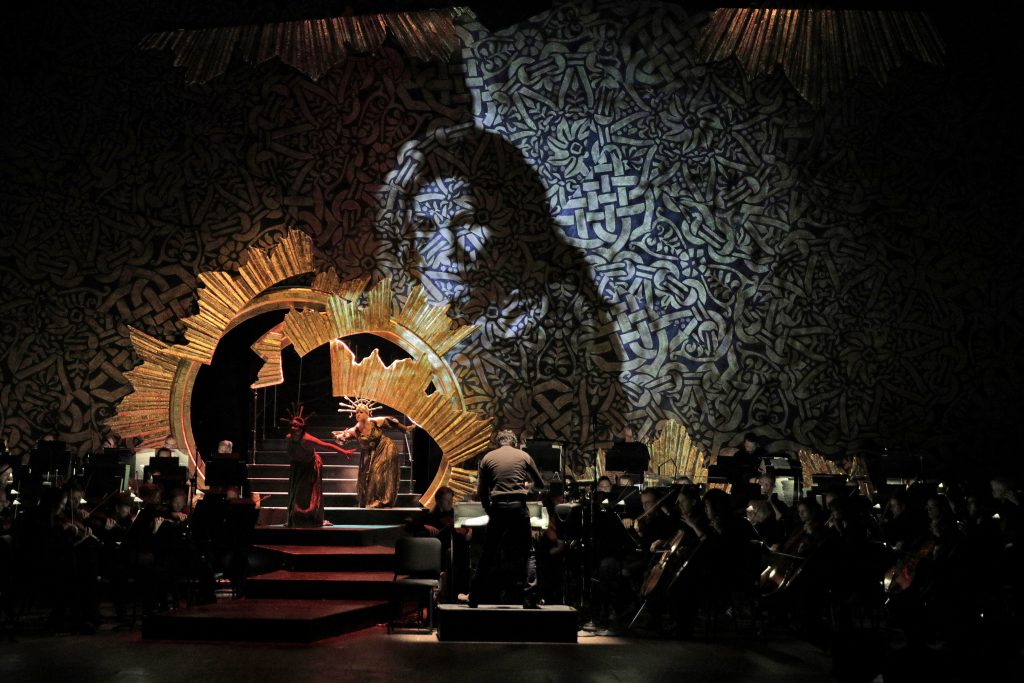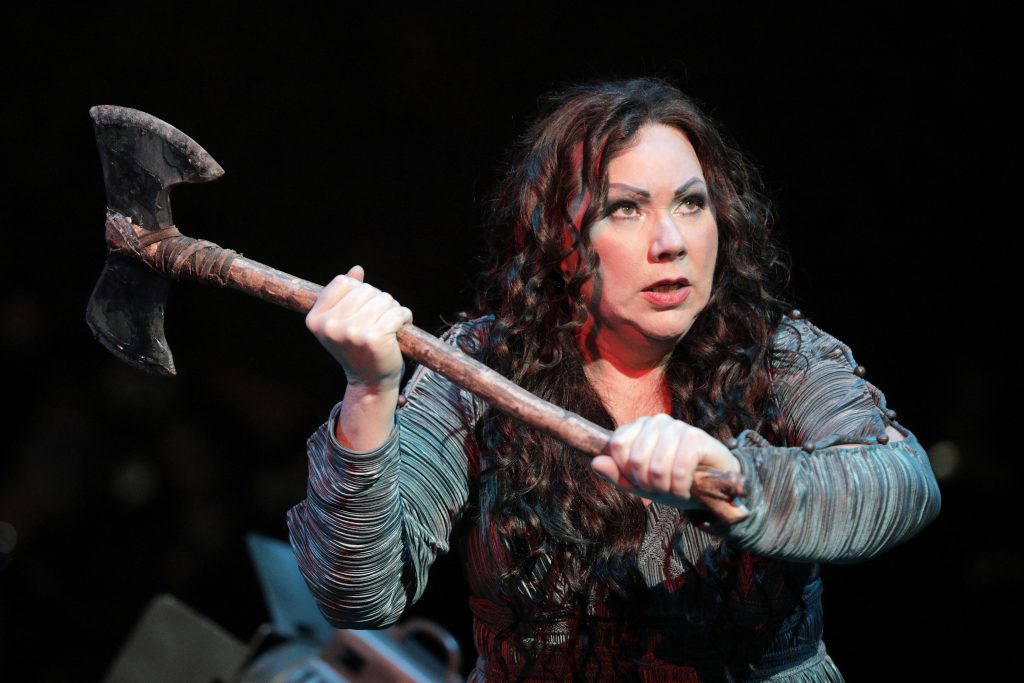By Katie Heilman special to The Sybaritic Singer
Photo credit: Cory Weaver for Minnesota Opera
The myth of Elektra and her quest for revenge has fascinated people for thousands of years. Richard Strauss’s operatic take on it is over a century old. Despite the familiarity of this story, Minnesota Opera’s production keeps it fresh with some interesting twists in the staging and set design, and it is a solid hour and forty minutes of intensity and excitement.
The Ordway’s stage is not the largest in the Twin Cities, and yet Minnesota Opera easily fits an 80-piece orchestra among the gilded, almost mystical-looking portal that serves as the main backdrop, turning the traditional pit into a thrust stage. The audience is awash in sound from the large orchestra and Strauss’s delightfully chaotic scoring, and yet the singers are never overpowered. The rest of the set is sparse, with occasional props such as walls rolled in to create separation between characters when needed. Stage Director Brian Staufenbiel’s reimagining of this ancient tale as a silent film in production is an excellent choice. The starkness of silent film make-up magnifies the facial expressions of each character, and anyone familiar with the plot will know that no character in this story could be considered “well-adjusted.” To add to the intensity of facial expression, a “camera crew” rotates around the performers and actually films the singers when they perform their arias, with the “film” projected on a suspended screen in a grainy black-and-white that allows every member of the audience the chance to see their faces up close.

In keeping with the theme of the silent film, the production itself opens with a silent film “prequel” to explain the exposition of the mythology that led to the death of Elektra’s father Agamemnon and started her quest for vengeance. In an era where classical music is finding ways to be more accessible, this was a great choice for anyone less familiar with the plot of either the opera or the myth itself. The entire audience starts on the same page, no matter what prior knowledge they bring into the show beforehand.
The singers themselves have so much presence in every moment that the “camera crew” never becomes distracting. The title role of Elektra rotates between two sopranos throughout the run due to the technical demands of the part. German soprano Sabine Hogrefe performed on opening night, and every motion she made was dedicated to displaying the deteriorating psyche of both Elektra and the “actress” playing her in silent film as she succumbs to her lust for revenge. Alternating in this role is soprano Alexandra Loutsion. Soprano Marcy Stonikas stands out as Elektra’s sister Chrysothemis, and mezzo-soprano Jill Grove gives a dominating performance as the tortured mother of Elekra, Klytaemnestra. While this show is heavily focused on the female characters, baritone Craig Irvin gives a great if brief performance as Orest, with tenor Dennis Petersen rounding out the main cast as Klytaemnestra’s lover, Aegisth.

This production is a dramatic, wild, exciting ride from start to finish. A critic of Strauss’s score called it the “color of blood,” and even though the set is meant to feel like a black-and-white silent film, one can feel that color of blood throughout every aspect of what is happening on stage, from the silent film “prequel” to the twist at the end. It is absolutely fantastic.
If you go:
This production is an hour and forty minutes, with no intermission, so it will be easier to schedule a night out than with some other operas. Elektra is running October 5-13, with tickets ranging from $25-$200. Tickets can be purchased online at mnopera.org/elektra.
![]() Katie is a composer, oboist, and beginner mandolinist based in Minneapolis, Minnesota. Katie currently works as the Program Assistant for Greater Twin Cities Youth Symphonies. She has a passion for using social media in the arts, as well as working behind the scenes to help the next generation of musicians.
Katie is a composer, oboist, and beginner mandolinist based in Minneapolis, Minnesota. Katie currently works as the Program Assistant for Greater Twin Cities Youth Symphonies. She has a passion for using social media in the arts, as well as working behind the scenes to help the next generation of musicians.
Katie is a fierce advocate for supporting local arts. You can usually find her attending a chamber music concert or theater show on any given weekend, and she has been a member of the Schubert Club’s arts ambassador group Theoroi since 2015. She is also involved in local new music society Punk-Ass Classical.
You can find Katie on Facebook, Soundcloud, Twitter, and Instagram.
